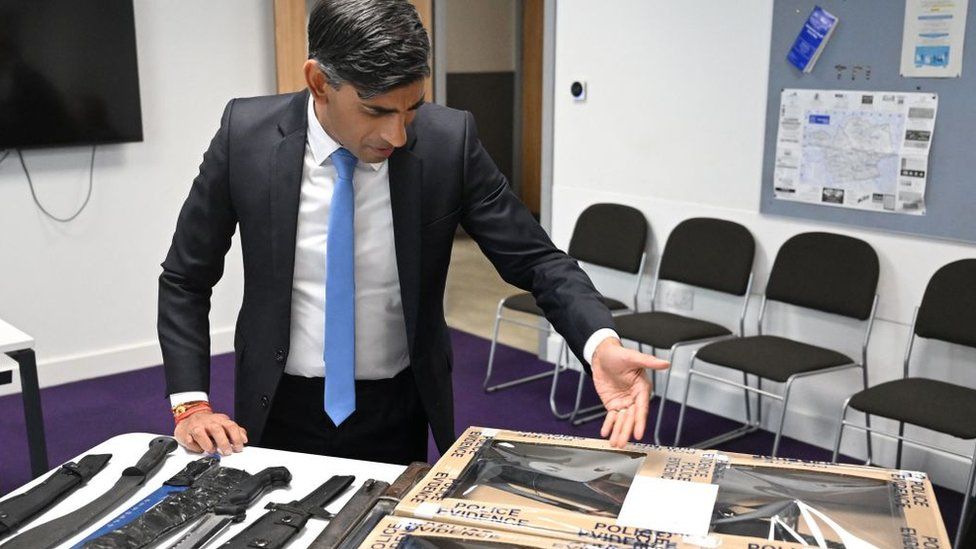ARTICLE AD BOX
 Image source, Getty Images
Image source, Getty Images
Prime Minister Rishi Sunak inspected seized weapons at a police station in London on Wednesday
By Tom Symonds & Marita Moloney
BBC News
The tightening of laws preventing the use of the so-called zombie knives will make a "big difference" to police, the prime minister has said.
Rishi Sunak believes giving officers more powers to seize and destroy such weapons with no practical use will make their jobs easier.
Zombie knives were first added to the government's list of prohibited offensive weapons in 2016.
Labour said loopholes on the sale of the knives online still exist.
The latest announcement is a further tightening of the law in England and Wales which follows decades of legislation to prevent the use of knives in general, and specific types often used in violent crime.
The maximum penalty for the importation, manufacturing, possession and sale of these weapons will be increased from six months to two years, as will the maximum penalty for sales to under 18s.
Zombie knives are defined as weapons having "a cutting edge, a serrated edge and images or words suggesting it is used for violence".
The government plans to extend the ban to "zombie-style" knives, by redefining them as "any bladed weapon over eight inches in length with a plain cutting edge and sharp pointed end that also has either a serrated cutting edge, more than one hole in the blade, or multiple sharp points like spikes."
This means some machetes could also fall under the restricted category, Home Office officials say.
The latest announcement is designed to help police with situations which fall outside the current laws.
In particular, officers have been unable to deal with zombie knives designed to get around the 2016 definition, by not having "images or words...that suggest it is to be used for the purposes of violence".
The Home Office also says police have not been able to seize some knives, which are legal but have been discovered when searching properties in a criminal investigation.
Officers will now be able to remove these knives if they believe they will be used in serious crime.
Home Office officials say this could mean domestic knives are seized if there is a risk of them being used to harm.
The government said the measures will be legislated "when Parliament allows" following a public consultation.
Image source, Getty Images
Image caption,Metropolitan Police Commissioner Mark Rowley joined the prime minister at Kilburn police station
Speaking to broadcasters during a visit to Kilburn police station in north west London, Mr Sunak said there was "no reason" why such knifes should be on the streets.
"Knife crime is appalling, it disproportionately affects young people and we should be doing everything we can to stamp it out," he said.
"We're giving the police more powers to confiscate knives when they come across them, when they're going about their day-to-day policing business."
Mr Sunak added: "Taken together, it's a strong set of powers that, having spoken to the police, they know will make a big difference to their ability to cut knife crime down."
Metropolitan Police Commissioner Sir Mark Rowley examined some of the weapons with the prime minister on Wednesday.
He welcomed the promise of new powers, saying the government had been working to find the correct legal measures and "we're pleased with the proposal today because it's what we need to do a better job of protecting communities".
"About 60% of our murders in London are knife enabled, and probably two-thirds of those are zombie knives and machetes. These are ghastly weapons doing awful damage on the streets of London," Sir Mark added.
The measures, first proposed in April, follow efforts by four previous Conservative home secretaries since 2016.
Labour's Yvette Cooper accused the government of failing to properly close gaps in the current legislation.
'Failing to close loopholes'
"This is the sixth time in seven years that the Conservatives have promised to outlaw zombie knives," she said.
"Yet even now they are still failing to close the loopholes that mean they can still be sold online."
The National Police Chiefs' Council welcomed the proposals, saying they would offer "robust measures" to tackle knife crime "when used appropriately".
There were 282 homicides in England and Wales using a knife or sharp instrument in the year ending March 2022 - the highest annual total since records began in 1946, according to the Home Office.
Knife crime increased by 9% in 2022 and around 45,000 offences were recorded.
The possession of a blade or sharply pointed object in public was first banned more than six decades ago, and expanded over the years to include other knives and legal requirements for folding knives or penknives.
Zombie knives were first banned in 2016 and three years later, a further definition was added which covered so-called cyclone knives with two spiralled blades.
The Home Office said specific exemptions would be made for "legitimate articles" such as objects of historical importance and those that are hand-made, in order to avoid negative effects on the antiques market.

 1 year ago
119
1 year ago
119








 English (US)
English (US)